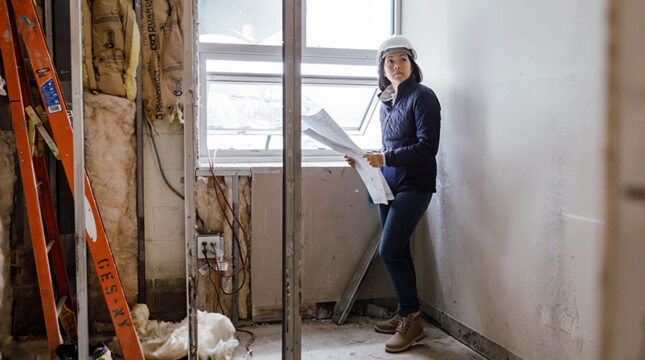Do you need a North Carolina general contractor license?
If you plan to complete construction activity worth more than $40,000, you’ll need to get a license in North Carolina.
Even if you might not take on projects of that size, you can benefit from having a license — it shows you’ve made the effort to meet the professional standards for your trade and are committed to staying on top of building codes and industry standards.
NC general contractor license limits
Different general contractor licenses in North Carolina limit the value of projects you can work on. Your eligibility for each license limit depends on your finances. If you lack working capital, you can take out a surety bond instead.
| License | Working capital needed to avoid a bond | Minimum bond required | Project limit |
| Limited | $17,000 | $175,000 | $750,000 |
| Intermediate | $75,000 | $500,000 | $1.5 million |
| Unlimited | $150,000 | $1 million | Unlimited |
Source: NCLBGC.org
North Carolina general contractor license classifications
License limits dictate the size of projects building contractors can take on, while license classifications determine what type of work can be done.
To qualify for a license classification, you must pass an exam. If you want to obtain more than one license classification, you must pass each test and fill out a separate application.
General contractor license classifications in North Carolina include:
- Building: Construction and demolition for commercial, industrial, institutional and residential structures.
- Residential: Construction and demolition of residential structures and individual units.
- Highway: Grading and paving public roads; construction of guard rails, sidewalks, gutters and other highway contractor projects.
- Public utilities: Construction of water and sewage systems, swimming pools, fuel lines and power lines.
- Specialty: Grading and excavating, boring and tunneling, concrete foundations and tanks, substations, fuel distribution, marine construction, and more are included as a specialty contractor.
- Unclassified: Includes all of the above classifications.
Insurance requirements for North Carolina general contractors
There is no statewide business insurance requirement to obtain a general contractor license in North Carolina, however there may be requirements at the local level.
For instance, contractors in Iredell County must maintain minimum coverage limits for general liability, automobile liability and workers’ compensation coverage. It’s best to check with your city or country regulatory office for local requirements.
Similarly, many projects and building construction permits ask contractors to have proper licensure and business insurance. The following types of insurance are recommended for most general contractors in North Carolina.
General liability insurance
General liability insurance for contractors protects your business from expenses related to common mistakes or accidents, including property damage and customer injury. As a commercial or residential contractor, you may need $1 million or more minimum general liability coverage in North Carolina.
For example, Charlotte general contractors must have a minimum of $1 million in commercial general liability insurance and list the City of Charlotte as an additional insured.
Workers’ compensation insurance
Workers’ comp isn’t required for an NC general contractor license, but state law requires this coverage for corporations, sole proprietorships, partnerships and limited liability companies with three or more employees.
However, some counties can have more strict requirements. In Iredell County, contractors or subcontractors must carry workers’ comp regardless of the number of employees.
Tools and equipment insurance
Tools and equipment insurance protects the tools and equipment you use as a contractor. In the event of theft or damage, it covers repairs and replacements.
Commercial auto insurance
Commercial auto insurance protects your construction vehicles, drivers and equipment while driving for business purposes. In North Carolina, most insurance companies determine the cost of a policy based on driver experience, vehicle condition, route hazards and vehicle usage.
You can add hired and non-owned coverage if you occasionally rent vehicles or use employee vehicles for business purposes.
Commercial property insurance
Having commercial property insurance will protect your business from damage and vandalism that may occur on your property.
The state may not require general contractors to produce a certificate of insurance in North Carolina. However, city and county governments may require contractors to carry liability insurance, even though state regulations do not.
General contractor license reciprocity in North Carolina
North Carolina doesn’t have full reciprocity with any other state. But exam waivers are available if you have an existing license in South Carolina, Tennessee, Louisiana, Georgia, Mississippi, Alabama, and Florida.
NC general contractor license renewal
You can renew your existing NC general contractor license online through the North Carolina Licensing Board for General Contractors website. The process involves submitting your financial statements, verifying employment and paying a license renewal fee.
How NEXT helps support North Carolina general contractors
NEXT makes it fast, easy and affordable to get the general contractor insurance you need — and you can do it all online.
We’ll ask a few questions about your business and give you a quote. You can select your coverage options and purchase your policy — all in about 10 minutes. Your certificate of insurance will be available immediately, and you can access your policy 24/7 via web or mobile app.
And if you have questions, our team of licensed, U.S.-based NEXT advisors can help.
Start a free quote with NEXT today.







